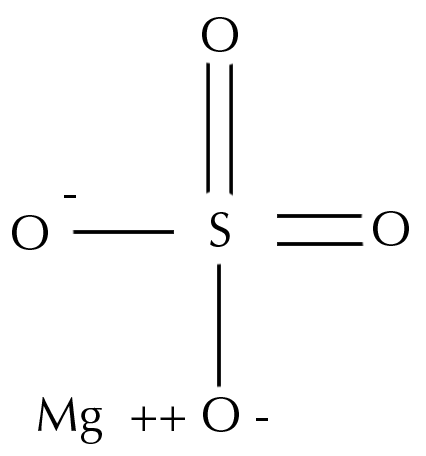What Is Magnesium Sulfate?
Magnesium sulfate is a natural ingredient that is used in cosmetics and skincare products. Magnesium sulfate is often used to help exfoliate the skin, help bulk out products and soothe irritated skin
There are many different forms of magnesium such as magnesium gluconate and magnesium chloride, all of which have slightly different benefits for the body and skin. Magnesium sulfate is a salt that is naturally found in the mineral epsomite, giving magnesium sulfate its commonly used name, Epsom salt. Epsom salt has been traditionally used as a component of bath salts, functioning as a healing agent and pain reliever. Epsom salt has also been taken orally as a laxative to relieve occasional constipation and to treat low levels of magnesium within the body.
Magnesium sulfate is typically manufactured by mining of natural minerals or by through manufacturing of the ingredient from other minerals.

Magnesium Sulfate
the good:Magnesium sulfate is generally used in body care products to help ease muscle tension and cramps. It is also occasionally used in skincare products to help balance out the natural oils the skin produces.
the not so good:There is some controversy over whether this type of magnesium is well absorbed through the skin.
Who is it for?All skin types except those that have an identified allergy to it.
Synergetic ingredients:Works well with most ingredients
Keep an eye on:More research into absorption through the skin.
What Are The Benefits of Magnesium Sulfate?
In cosmetics and skincare products, magnesium sulfate is used at concentrations up to 11% and 25% depending on if there are to be used as a leave on product like a moisturizer or a rinse off product like a body wash. Magnesium sulfate is mainly used to gently exfoliate the skin, help relive muscle soreness, bulk out products and more recently balance the skin’s natural oils.
Exfoliating
Magnesium sulfate exists in the form of small, crystalline particles, which enables this ingredient to function as a gentle exfoliant. Products that contain magnesium sulfate help to exfoliate the top layers of skin, removing dead skin cells, makeup, excess oil, dirt, and other impurities that may have accumulated during the day.
Removing dead skin cells that build up on the skin’s surface is crucial in order to maintain clear skin. This is because the accumulation of extra dead cells can clog pores, eventually turning into blemishes or preventing the skin from maintaining moisture normally. Furthermore, exfoliating becomes even more important as we age since the skin’s natural cycle of shedding dead cells slows down.
Bulking
Since magnesium sulfate is a non-reactive, solid ingredient, it can also be used as a bulking agent in cosmetic formulations. Bulking agents are used to dilute other solids or to increase the volume of a product. This is especially important if you have strong active ingredients that need to be spread across a formulation.
Natural oils
Magnesium sulfate may also help to reduce blemishes on the skin. Blemishes form due to excess sebum and bacteria clogging pores, followed by inflammation. Research suggests that magnesium sulfate may help to soothe irritated blemishes, helping them to heal faster and reduce the excess sebum that is often produced in congested skin types. It is important to note that the value of using magnesium sulfate for breakouts has not been fully evaluated.
Tension
Magnesium sulfate as Epsom salt is typically added to warm water like a bath in order to relieve pain and inflammation. In water, magnesium sulfate breaks down into magnesium and sulfate ions. Both magnesium and sulfate are readily absorbed through the skin and into the bloodstream. Replenishing magnesium levels has several health benefits, including soothing, promoting relaxation, relieving muscle aches and pains, and supporting the natural healing of small cuts and scrapes.
Does Magnesium Sulfate Actually Absorb Through The Skin?
This is a controversial area as there have been studies that suggest difference levels of absorption depending on the concentration and environment. Generally, transdermal absorption does seem to occur to help relax and soothe the muscles however as Healthline discusses, it may not improve the magnesium levels within the body. If you are looking to address your magnesium intake, consult with your doctor about which supplement would best compliment your diet.
Is Magnesium Sulfate Safe?
The Cosmetic Ingredient Review Expert Panel, a group that is responsible for reviewing the safety of skincare ingredinets, noted that the history of safe medical use of magnesium sulfate indicates no significant toxicity concerns relating to systemic exposure to this ingredient. Furthermore, the extensive clinical experience of the Panel, including the results of numerous patch tests, indicates that magnesium salts do not have the potential to induce sensitization. The Panel concluded that magnesium sulfate is safe in the present practices of use and concentration in cosmetics, when formulated to be non-irritating.
References:
Gröber, U, Werner, T, Vormann, J, & Kisters, K, 2017. ‘Myth or Reality-Transdermal Magnesium?’, Nutrients, 9(8), 813. Johnson, W, et al. 2018. ‘Safety Assessment of Magnesium Sulfate as Used in Cosmetics’, International Journal of Toxicology. Chandrasekaran, N, et al. 2014. ‘Effects of magnesium deficiency – More than skin deep’, Experimental Biology and Medicine, vol. 239.







